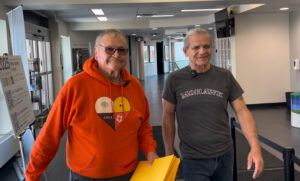The owners of Ottawa area Indigenous cannabis dispensaries and their supporters assert their constitutionally protected Aboriginal and treaty right to an economy on their unceded lands.
Supporters of Indigenous rights listen as store owner Robert Fisher speaks outside of the Ottawa Police Services HQ on May 14, 2025.
By Dispensing Freedom Staff
OTTAWA – Over 75 people gathered outside the Ottawa Police Services headquarters at 474 Elgin St. to protest the actions of Supt. Jamie Dunlop of the “Serious and Organized Crime Directorate” on May 14th, 2025. Supt. Dunlop has been leading an Ottawa Police campaign to shut down Indigenous cannabis dispensaries in Ottawa by intimidating their landlords. In April of 2025, multiple store owners had undated letters signed by Dunlop delivered to their landlords threatening fines under the Cannabis Control Act of “at least $10,000 and not more than $250,000.”
In response, Indigenous store owners who assert a constitutionally protected Aboriginal and treaty right to trade on unceded Indigenous lands, have joined together and created a 1701 Treaty Trade Council to organize themselves and collectively assert their right to an Indigenous economy. Former National Chief Del Riley has been actively representing the store owners and over the last two years has sent over a dozen letters seeking meetings with the City of Ottawa and Ottawa Police Services.
The store owners have also hired lawyers involved in the R. v. White and Montour case, a landmark decision in Quebec which ruled that the Covenant Chain is an existing and valid treaty between the Crown and the Mohawks and that the Crown erred in not consulting with the Mohawks before imposing the 2001 Excise Act. Lawyers Gordon Campbell and Gary Chako wrote a letter to Supt. Dunlop on April 28th, arguing that “both the City and the Ottawa Police Service have failed to engage with our clients in working out reasonable consultation and accommodation of their Treaty and Aboriginal rights. The City and OPS appear to be evading a lawful testing of our clients’ rights in an independent, objective court of law through failing to directly charge Indigenous individuals who could invoke their Treaty, Aboriginal and other rights in their own defence.”
For its part, while the Ottawa Police Service publicly recognizes that “Algonquin Anishinaabe people have lived on this land since time immemorial, and that this area, including the City of Ottawa, is part of unceded Algonquin territory,” the OPS press releases documenting their raids make no mention of the fact the two stores they raided are Indigenous stores exercising constitutionally protected rights. No charges have been laid in either raid at this point, although tens of thousands of dollars of Indigenous trade goods have been seized.
Store owners decry “economic genocide’
Former National Chief Del Riley speaking outside the Ottawa Police Services HQ.
At the rally outside the OPS Chief Riley gave some historical context to Canada’s racist suppression of the Indigenous economy, “You know, from 1876 till 1951 we were not considered persons, so we couldn’t get involved at all in the economy of the country…. the problem is the whole setup against our people has always been racist.” Explaining Canada’s 1867 BNA Act as a means to get “free access” to Indigenous resources, Chief Riley stressed that while the “Caucasoid people” have “taken very good care of themselves… our people are stuck in these concentration camps, yet with no visible means of support, no economy, and that’s further complicated by the fact that [Indian Act] Chiefs and councils are really part of the Federal government.”
Many Indigenous cannabis dispensaries opened up on Indian reserves across Canada in the lead up to the 2018 legalization of cannabis, and today there are over 500 such sovereign stores. After Covid-19 “lockdowns” in 2020 and 2021 disrupted the Indigenous economy by closing down on-reserve shopping, off-reserve Indigenous stores began opening in cities like Toronto, Halifax and Moncton asserting an economic right to operate on unceded traditional territories.
Red Roots Trading Co. owner AJ Tenasco speaks at the rally on May 14.
AJ Tenasco, the owner of the Red Roots trading company has been the public face of this initiative in Ottawa, releasing a video in April of 2023 showing his efforts to reach out to City Hall and the Ottawa Police. In January of 2025, Tenasco made another video thanking the City and the police for not interfering with his stores and showcasing the efforts his business has made in giving back to his Algonquin community of Kitigan Zibi. Speaking at the rally, Tensasco noted that “We’ve tried to communicate with the government officials here and the police… numerous times. They came and kicked in our door when they tried to get the landlords to do their dirty work for them and tried to terminate our leases. Instead of them choosing to sit down with us and discuss our treaty rights, and honour the City of Ottawa reconciliation agreement or honour our treaties, they chose to steal $94,000 of inventory from my store.”
Tenasco, who donates 16% of the profits from his stores back to his home community of Kitigan Zibi, pointed out the damage that the police raids did to Indigenous peoples. “That inventory that they stole from my stores could have bought 25 water filtration systems for 25 homes in Kitigan Zibi. I can’t even go home and drink my water. I bet Jamie Dunlop doesn’t know what that’s about. He doesn’t know what it’s like to not be able to walk into your home to drink the water out of the faucet. He makes $215,000 a year here to commit economic genocide on Indigenous people.”
Tyendinaga Mohawk entrepreneur Robert Fisher Tehonikonrathe holds a sign outside the Ottawa Police Services HQ on May 14th, 2025.
Mohawk entrepreneur and owner of the My Legacy Cannabis Dispensary, Robert Fishert spoke about Ottawa being unceded Indigenous territory of the Algonquin and Mohawk people. Fisher noted “why do we need licenses from them? Why do we need to follow their license when the treaties say our laws are the number one laws here.” Fisher added, “We’re not the law breakers. They are the law breakers.” Referring to the incentives behind the police actions, Fisher stated in reference to the Ontario licensed cannabis retailers “All of those guys [operating the OCS stores] are ex-police… and they’re all friends with these guys here, who keep raiding us.”
Regarding the Covenant Chain treaty relationship with the Crown, Fisher stated “they lived up to it until they became bigger than us, and then they abandoned [the treaty]. No longer did they respect their words or the words of their King, but that’s what brought us to where we are today. We’ve always had the right [to trade]. We’ve never been able to enforce it.”
Taking further steps to organize for Indigenous rights
Audrey Redman spoke about the medicinal values of cannabis and the need for Indigenous people to organize to assert their rights.
The last speaker at the rally was Audrey Redman, Dakota from Standing Buffalo in Saskatchewan. Redman spoke about surviving residential school and the “60s scoop” of Indigenous children. Redman spoke of the importance of cannabis to her health, noting that cannabis has been key to eliminating the seizures she suffered after falling off a ladder cleaning the residential school. “I fell and split my head open, and I lost my sight at that time, and they just put me in a room by myself. I could have died there, like many other children died… The seizures… didn’t stop until I started using cannabis, and I haven’t had one since.”
Redman concluded her speech with a plea that Indigenous people and their allies come together and organize to fight for their rights. “The only way we’re going to take this back, is when we come around together, talking together again, when we plan. We have elders, we have leaders, we have intelligent people, and they have underestimated us. We are still here after what they’ve done to us.”
After the rally, a public meeting was held at Cartier Place Hotel to do exactly what Redman suggested. Over 50 people met for an hour and half, and had a thorough discussion about the issues at hand. Participants in the meeting were shocked to discover that while the protest was being held at the police station, the OPS raided yet another Indigenous trading post which had closed for the day to send its staff members to the protest.
Actions are being planned by the Treaty Council to raise the issue of Ottawa Police racism with King Charles III who will be arriving in Ottawa on May 26th, and who will give the speech from the Throne in the Senate on May 27th.







Comments are closed.